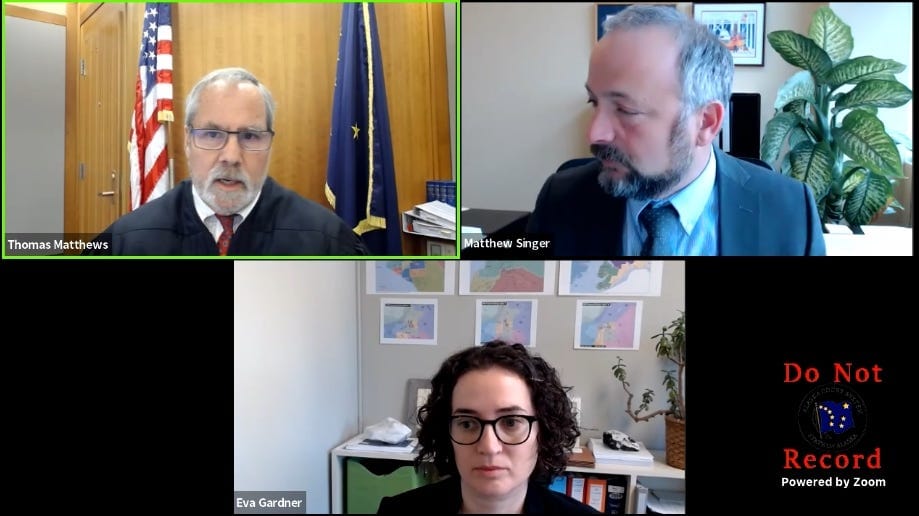Alaska Redistricting: Can you wash the stink off a gerrymander?
"The new question for the court to answer is does remand cure a gerrymander?" asked Gardner, the attorney for Girdwood. "Could a board launder its illegitimate business through the courts?"

Good evening, Alaska!
In this edition: A rundown of today’s oral arguments in the Alaska Redistricting case, where the Alaska Redistricting Board and the Girdwood plaintiffs went toe-to-toe on whether Anchorage-area Senate maps repeat the unconstitutional partisan gerrymander that Judge Thomas Matthews and the Alaska Supreme Court already identified. It seems like it’ll come down to whether the unconstitutional gerrymander identified by the courts was strictly about the disadvantage on East Anchorage or whether it was about that and the advantage given to the deeply conservative Eagle River? If it’s the latter, then the Alaska Redistricting Board is in trouble because Judge Matthews noted today, “We’ve still got a map which benefits Eagle River, don’t we? So, isn’t this simply the same result in a different package?” Meanwhile, the Legislature is at a stand-still over closed-door negotiations over the budget play out.
Legislative day: 115
Current mood: 🙃
Something fun: Acts of kindness multiply: The story from one Midtown Anchorage drive-thru
Programming note: I have a somewhat significant appointment with the oral surgeon tomorrow—I know, I have the best timing—so I likely won’t have an immediate breakdown on whatever happens with the budget (though, if we’re behind clear, the Legislature likely won’t have it figured out soon anyways). If action does go down, the Alaska Beacon’s James Brooks is the reliable source to track the action.
A gerrymander by any other name

The fate of Alaska’s redistricting plan was back in court today for oral arguments on the last big challenge to the work of the Alaska Redistricting Board, arguing over whether the board’s plan to pair Eagle River with South Anchorage is essentially the continuation of the same partisan gerrymander the courts identified and sent them back to correct. The Alaska Redistricting Board argues everything’s fine because the board discussed its decisions in public this time around while the Girdwood plaintiffs, who brought the case, argue that the rotten intent of the board’s conservatives to enshrine a Republican advantage in the Anchorage state Senate maps is still the same.
This case shares many similar components to the case successfully argued by the East Anchorage plaintiffs, arguing that Eagle River’s deeply conservative voters would overwhelm the voters in South Anchorage and strip them of effective representation in the Legislature. While the board argues there’s no similar problem here because South Anchorage has reliably elected Republican state legislators, the Girdwood plaintiffs point out that it went to Biden and Galvin in the most recent election (and the district also nearly elected an independent for the state House).
There’s also accusations that the board ignored clear public input and relied on, at best, stretches of the imagination when justifying the connection between Eagle River and South Anchorage in one Senate district as well as the Eagle River and JBER/Government Hill connection in the other Senate district. Gardner went to length to argue that the connections that made the Eagle River and JBER state Senate district sacrosanct—shared high schools and military connections—were either flat wrong (JBER students don’t actually go to school in that Eagle River district) a stretch supported by insufficient evidence.
But the key issue here is whether the board’s conservative majority maintained some sort of illegitimate purpose in its drawing of the Senate maps. It’s important because the Alaska Redistricting Board does ultimately have near to free rein to decide the layout of the maps—unless you explicitly say your proposed maps will give Eagle River a shot at “more representation”—and it’s why we got a good look behind the scenes as was detailed in yesterday’s memo. The Girdwood plaintiffs are working hard here to establish that the board was still dead set on giving Eagle River and the Republican party at large an advantage with the new maps.
“The new question for the court to answer is does remand cure a gerrymander?” asked Eva Gardner, the attorney for the Girdwood plaintiffs. “Could a board launder its illegitimate business through the courts? The answer has to be no.”
This content is for Paid Members
Unlock full access to The Alaska Memo and see the entire library of members-only content.
SubscribeAlready have an account? Log in



